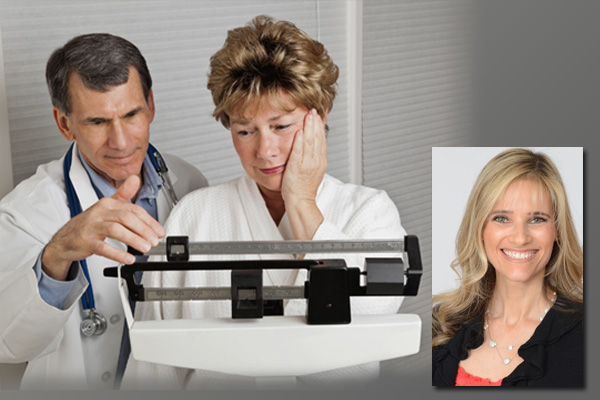Weight Loss After 35

Weight loss is a challenge. Weight loss after 35 even more so. That’s why CDiabetes.com joined with Lauren Pincus RD, @LaurenPincusRD, for a twitter chat last February 25, 2015 on weight loss, metabolism, and healthy eating after 35. Here’s some valuable information from that event.
Is it true that metabolism slows down after 25, making it harder to lose weight?
Metabolism slows approximately 5% every 10 years, which means that you actually need 100 calories less every day to just maintain your weight. Additionally, insulin resistance increases with aging, so you need fewer carbs to maintain a good balance in your diet. Both of these factors mean that if you don’t adjust what you are eating, over time you will end up gaining weight.
Also, after age 35, you lose .5% of your muscle mass each year. Add strength training to your physical activity to help preserve your muscle tone.
How can I increase my metabolism?
Eating certain foods, and including cardio and weight training in your workout routine, will help increase your metabolism.
Eat breakfast! Just as your car needs gas, your body needs food to jump start your metabolism first thing in the morning.
A recent study has shown that 3-4 cups of green tea a day can increase your metabolic rate by approximately 4% – that could be 50-100 calories!
You also want to “fuel up” on water. Most of us are mildly dehydrated and that can slow metabolism. Women should drink 9 cups a day and men should drink 13 cups of water a day.
How much food should I eat and how important is portion control?
Portion control is everything. Never eat from a bag or box; serve yourself one portion and put the rest away!
MyPlate is an excellent guide for how to eat. When filling your plate stick to 1/2 veggies, 1/4 lean protein, 1/4 whole grain.
If you can, instead of eating 2 or 3 big meals, eat smaller meals throughout the day. Fill up on foods that are high in protein and fiber and with a low glycemic index.
Remember, just because something is whole grain doesn’t mean you can eat an unlimited amount. Limit even “healthy” whole grains – eating too many can increase your blood sugar, too.
Do you need “diet” products to lose weight? Are sugar free foods better?
Be careful with “diet” products, which are often filled with more chemicals than nutrients. Stick with healthy whole foods whenever possible.
Low sugar foods can help with blood sugar levels, but you can also consider alternative sugars, like honey, stevia, etc.
How important is sleep to losing weight after 35?
Very important! Sleep deprivation stimulates certain hormones which substantially increase your appetite.
There is even evidence that too little sleep can affect hormones and metabolism in ways that promote Type 2 diabetes. And, those sleeping less than 6 hours a day are almost 30 percent more likely to become obese than those who slept 7-9 hours.
How can I stop eating just because I’m bored, stressed or tired?
When we’re bored, stressed or tired we often reach for bad “comforting” foods.
Getting enough sleep should help manage those cravings. Practice all your stress reduction techniques, and keep your hands occupied.
One important thing is to eat a good, high protein breakfast. Just this can help lower your stress levels and keep your blood glucose in a good range.
I want to lose weight, but I don’t want to be hungry all the time. What can I eat?
Stick with protein- and fiber-rich foods to control blood sugar and keep you full. Roasted chick peas, pumpkin seeds, fruit with nuts and cheese, pears (a low glycemic index fruit) and baked sweet potato fries are all great choices. Hummus or guacamole with cut veggies gives you flavor and crunch, satisfying that urge to munch.
Beware of snack bars or protein bars – they can be packed with calories and sugar, just like a candy bar. Make sure you read your labels!
Will stress and worry make it harder for me lose weight after 35?
When you’re under stress, there’s an urge to do something to relieve it. Often that something is food. So if you’re worried or have stress, find effective ways of dealing with it other than eating.
Should I talk to my doctor before starting a weight loss regimen?
Absolutely. Some changes in eating habits or exercises are not appropriate for people with certain medical conditions. Weight loss can affect the medications that you take, too. So get an okay from a medical professional, and see a dietitian!
So what should I eat to get started on losing weight after 35?
Pump up the veggies! In a study, people who ate casseroles made with added puréed vegetables consumed 200-350 fewer calories per meal.
Eat more meals with fish, like salmon, and steamed veggies. And salads and soups are great. They’re filling, and an easy way to get extra veggies into your diet.

